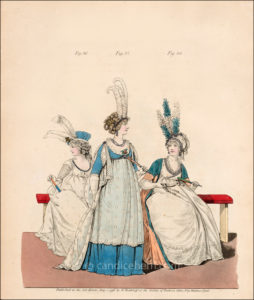
Opera Dresses, 1796
Lord Byron sent over a note to say that he had ordered tickets for the opera at Teatro la Fenice for the whole party. Contessa Guiccioli had already arrived and was in residence, and they would travel in the two gondolas, Byron’s own and Mr. Darcy’s.
“I long to see her,” enthused Lydia as they were dressing, “That maid Elise told me she is the most beautiful creature in the world.”
“I am surprised you are at all eager to see a woman you must perceive as a rival,” commented Elizabeth.
“Oh! She is no rival, no matter how beautiful she is. Don’t you know, Lizzy, she is nothing but Lord Byron’s mere concubine. His mistress. He will abandon her soon enough, while I am the mother of his child!”
“That he does not acknowledge,” Elizabeth reminded her.
“But he will, of course, sooner or later,” said Lydia confidently. “Why, little George is his only son! A man does not turn away from his only son, aristocrats never do. He will make him legit-a-what do you call it, for sure. And then I will become Lady Byron!”
“Even you, Lydia, must see the folly in that. Pray tell me, how can you and Byron marry, when you are both married to other people?”
“Well, it doesn’t much signify, does it? It will happen some time or other. Whenever his son is ack – ack, whatever.”
“Acknowledged.”
“Or Lady Byron may die. Then I will replace Contessa Goochy, and be with Byron for ever and ever!” finished Lydia triumphantly.
Elizabeth would not waste her breath in anything so foolish as further argument, but consoled herself with the thought that, unlikely as it seemed, perhaps Mr. Collins was right, and Italy was an immoral place. “But then, these marriages were made in England, and it is difficult to decide which was formed under a more evil star, Lord Byron’s or Lydia’s,” she mused.
“I am certain Lord Byron can have no trouble getting his horrid wife to divorce him,” Lydia proceeded. “He hates her. Annabella Sillybanks.”
“Milbanke,” corrected Elizabeth absently. “But really, Lydia, do you not realize that a divorce is scarcely possible to obtain? It requires an Act of Parliament.”
Lydia shrugged. “What of that? Byron is rich enough, and a peer of the realm. He could do it I am sure.”
Elizabeth sighed. “It is useless to speak to you. The world knows, if you do not, that Lord Byron and his wife signed only a deed in separation, not divorce, which he could not obtain, with his finances and reputation; and besides neither he nor his wife has the wish to marry again. The separation therefore guarantees that the situation will remain. But you are not attending.”
“Oh yes I am,” said Lydia unexpectedly. “But I will change all that. You will see.”
“And what about yourself, then? Need I remind you that we are dressing at this moment to go in search of your husband?”
“I can’t think why. If he doesn’t want to be found, I am sure I have no wish to find him.”
Elizabeth shook her head. “It would be best that you should be settled back in England as a family.”
“Pish! Where is the fun in that? I suppose you and Darcy mean to stick us in some miserable cottage of shame in the vicinity of Longbourn. You won’t allow us within ten miles of Pemberley I am sure, though Kitty practically lives there. It is not fair.”
“She has married our vicar,” Lizzy reminded her. “But really it all depends upon getting Wickham a proper situation. He must support himself. And now that he has sold his commission to pay for this trip to Italy, he is no longer eligible for military service. He is without prospects.”
“But he is fortunate in his connections,” Lydia said cheerfully. “I still think you and Mr Darcy could find him a position about the Court, if you only would.”
Lizzy considered. “Strange to say, it may not be as far fetched a plan as all that. With Lady Catherine’s influence…”
Lydia brightened. “And Wickham does look so handsome in a uniform. The Kings Household Guards wear such a pretty red one. I would be much happier to be settled at Court than at Longbourn. Think of the officers! And the balls!”
“Fortunately you can derive much consolation from picturing it. First things first however. We must get to the theatre. That dark green sarsanet is suitable for you, with my black cloak, and there is not much danger of ruination as we shall not be dining.”
“Such a dull colour,” Lydia said grumpily. “How do you expect me to outshine Countess Goochy in this?”
“It will do for finding your husband, however,” Lizzy reminded her.
“How you do go on! What makes you think I want to find him.”
Mr. Darcy came to his lady’s chamber. “The gondola is ready. Ah! You look lovely, Elizabeth. That silver cloth gown becomes you. And the matching trimming in your dark hair.”
“I don’t know why I can’t be wearing something like that,” Lydia pouted. “I’m not so sure I want to go, in this frumpish thing.”
“Don’t you want to see what Contessa Guiccioli is wearing, Lydia?” Elizabeth reminded her artfully.
That could not be controverted. They joined Lady Catherine and Mr. Collins on the private gondola quay below the palazzo.

4 comments
Skip to comment form
Talk about flogging a dead horse! If Lydia wanted a wealthy lifestyle she shouldn’t have run off with such a wastrel! But then she’s still totally delusional!
I don’t think she was exactly thinking logically at 16, Glynis, but then again, I don’t have much hope of her thinking logically even at a more advanced age! Thanks for commenting.
Loving the reads
Your Austen stories are the only ones I can bear to read!